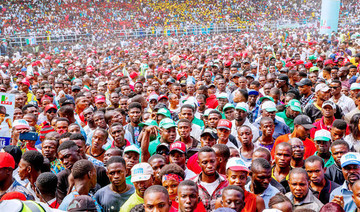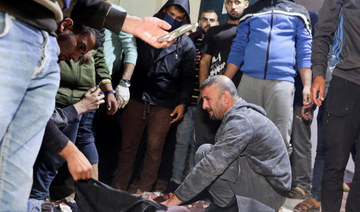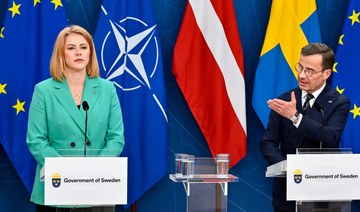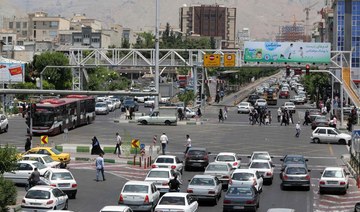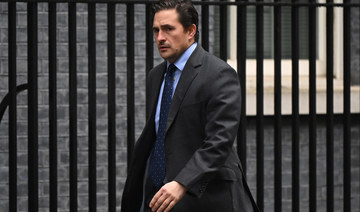KANO, Nigeria: Nigeria’s electoral commission delayed the presidential election until Feb. 23, making the announcement a mere five hours before polls were set to open Saturday. It cited unspecified “challenges” amid reports that voting materials had not been delivered to all parts of the country.
Residents of Africa’s most populous nation and largest democracy will soon wake up to outrage. Many had relocated for the chance to vote.
“This was a difficult decision to take but necessary for successful delivery of the elections and the consolidation of our democracy,” commission chairman Mahmood Yakubu told reporters in the capital, Abuja. He said more details would be released during an afternoon briefing.
A review of logistics, along with the determination to hold a credible vote, led the commission to conclude that going ahead with the election as planned was “no longer feasible,” he said.
Nigeria also postponed the previous presidential election in 2015 because of deadly insecurity in the northeast, which remains under threat from Islamic extremists.
As word filtered out after midnight of a possible election delay at least in some regions, the Situation Room, a civil society collective monitoring the vote, said in a statement that “any suggestion that the election be held in a staggered manner will be totally unacceptable, and would be a recipe for a disastrous election.”
More than 84 million voters in this country of some 190 million had been expected to head to the polls in what is seen as a close and heated race between 76-year-old President Muhammadu Buhari and top challenger Atiku Abubakar, a billionaire former vice president.
Both have pledged to work for a peaceful election even as their supporters, including high-level officials, have caused alarm with vivid warnings against foreign interference and allegations of rigging.
“This is truly disappointing but ... Nigeria will prevail,” the spokesman for Vice President Yemi Osinbajo said on Twitter, noting that Buhari was already in his hometown where he had been set to vote.
When Buhari came to power in 2015 he made history with the first defeat of an incumbent president in an election hailed as one of the most transparent and untroubled ever in Nigeria, which has seen deadly post-vote violence in the past.
Now Buhari could become the second incumbent to be unseated. His term has been marked by a crash in global oil prices that spun Nigeria’s heavily crude-dependent economy into a rare recession, from which it only emerged in 2017. Unemployment shot up. The country passed India as the nation with the most people living in extreme poverty. More than 13 million children are said to be out of school.
Insecurity on multiple fronts has seen little improvement, worrying neighbors of the West African regional powerhouse and beyond. While the military pushed Boko Haram extremists out of many communities in the country’s northeast, claims of the group being “crushed” have withered in the face of continuing violence. A new offshoot pledging allegiance to the Daesh group has surged in recent months, attacking military bases — and this week, a governor’s convoy — sending tens of thousands of people fleeing anew.
On top of that, banditry in the northwest, oil militants in the south and deadly fighting in the central region between farmers and herders over increasingly precious land keep security forces stretched and the population on edge. On Friday, authorities reported at least 66 deaths in a single community this week in what one resident blamed on farmer-herder clashes.
“We love our country and we need our country to be safe from all the violence ... and all the nonsense that takes place during election time,” worshipper Amin Muhammad Khalif said as he emerged Friday from prayers in Kano, Nigeria’s second-largest city in a nation largely evenly split between Muslims and Christians.
Even in the fight against corruption, in which Buhari could claim some progress, many in Nigeria have expressed concern that those targeted are mostly opposition figures..
Meanwhile, many Nigerians worry about Buhari himself after he spent more than 150 days outside the country for still-unspecified medical treatment. Spare in both charisma and physique, Buhari spoke for just a few minutes at his final campaign rally on Thursday and struggled to hear or grasp a number of questions in a recent televised town hall.
Borrowing a page from President Donald Trump’s playbook, top challenger Abubakar has campaigned on the theme of “Let’s Make Nigeria Work Again,” while vowing to apply his business acumen to privatize Nigeria’s all-important state oil company and lift 50 million people out of poverty by 2025.
Despite such proclamations, Abubakar has never managed to shake years of corruption allegations. And, as Buhari grumbled in his final pre-election address to the nation on Thursday, one “cannot simply proclaim jobs into existence.”
In the end, the now-delayed vote could come down to the sorry state of Africa’s largest economy and people’s empty pockets, and stomachs.
In Abuja, 56-year-old Bako Sharibu was wrist-deep in a dumpster as he fished out pieces of plastic for recycling. His shy smile disappeared as he recalled that he once had good work as a janitor. Now he struggles to make his target of 300 naira (83 cents) a day.
“Everybody suffers too much. Hungry everywhere,” he said, adding that if he could save a few thousand naira he would send the money to his three children in northern Kaduna state.
Then he shook his pocket. It was near sunset. He had just 50 naira in hand.
He will be voting for Abubakar, he said. Nigeria needs change.
Nigeria postpones presidential election for one week
Nigeria postpones presidential election for one week
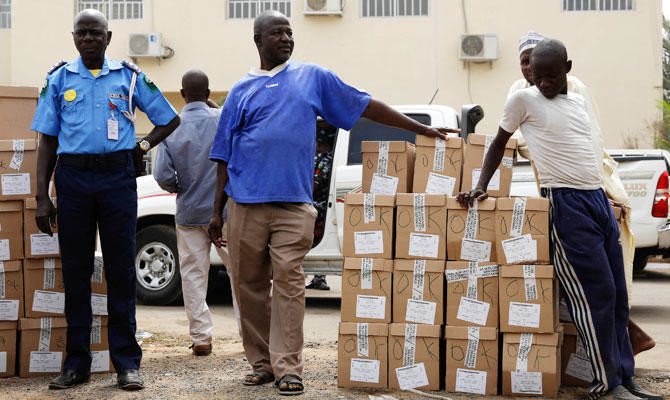
UK’s foreign secretary supported arms sales to Israel days after British aid workers killed in Israeli strike
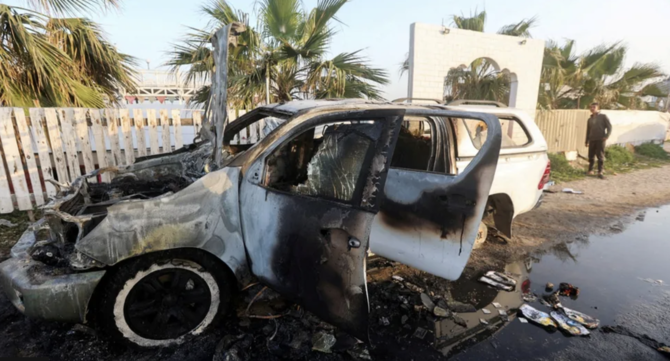
- Attack on World Central Kitchen convoy killed 7 people in total
LONDON: Britain’s foreign secretary recommended that the UK continue selling arms to Israel just days after an Israeli strike on a World Central Kitchen convoy killed three British aid workers.
David Cameron supported the continuation of arms sales two days after the strike on April 1, and the Secretary of State for Business and Trade Kemi Badenoch approved the decision on April 8, The Guardian reported on Thursday.
Cameron said earlier this week that the strike that killed the Britons, in addition to four aid workers of other nationalities, revealed systemic and personal failures by members of the Israel Defense Forces.
Cameron’s decision seems to have been based on an assessment of Israeli compliance with humanitarian law that did not cover the deaths of the aid workers due to a time lag in the government’s process for deciding if British arms exports were at risk of being used to commit war crimes.
There was a possibility that the business department’s assessment did not cover any incidents after Jan. 28.
An update on the handling of arms export licenses that took into consideration events up until the end of February was prepared, but the British Foreign Office has declined to say if that was included in the advice given to ministers.
Opposition Labour MPs claim the time delay means there is a possibility that no comprehensive ministerial-level assessment of Israel’s conduct of the war in Gaza has been made in the last three months.
Lawyers and campaigners who have examined the evidence provided by the Foreign Office have come to the same conclusion.
World Central Kitchen said on Monday it would resume operations in the Gaza Strip, a month after the Israeli airstrike.
Prior to halting operations, WCK had distributed more than 43 million meals in Gaza since October, representing by its own accounts 62 percent of all international nongovernmental aid.
NATO condemns Russian ‘malign activities’ on its territory

- The incidents “are part of an intensifying campaign of activities” Russia is carrying out across the Euro-Atlantic area
- NATO allies “express their deep concern over Russia’s hybrid actions, which constitute a threat to allied security“
BRUSSELS: NATO on Thursday condemned Russian “malign activities” on its territory, saying actions like disinformation, sabotage, violence and cyber interference threatened the alliance’s security.
The incidents “are part of an intensifying campaign of activities” Russia is carrying out across the Euro-Atlantic area and NATO allies “express their deep concern over Russia’s hybrid actions, which constitute a threat to allied security,” NATO said in a statement.
Authorities in the Czech Republic, Estonia, Germany, Latvia, Lithuania, Poland and Britain have recently investigated and charged people in connection with “hostile state activity.”
NATO said allies would work together to deter and defend against the hybrid actions and that they would remain steadfast in supporting Ukraine as it struggles to fend off Russia’s invasion, now in its third year.
Last month, a 20-year-old British man was charged with masterminding an arson plot against a Ukrainian-linked target in London. Moscow’s ambassador Andrey Kelin dismissed claims of links to Russia as “absurd” and “unfounded.”
In late March, Czech authorities said they had busted a Moscow-financed network that spread Russian propaganda and wielded influence across Europe, including in the European Parliament.
Israeli private eye arrested in UK over alleged hacking for US PR firm

- An initial attempt to extradite Amit Forlit to the United Sates was thrown out by a judge at Westminster Magistrates’ Court on Thursday
- Forlit was arrested under an Interpol red notice at London’s Heathrow Airport
LONDON: An Israeli private investigator wanted by the United States was arrested in London over allegations that he carried out a cyberespionage campaign on behalf of an unidentified American PR firm, a London court heard on Thursday.
An initial attempt to extradite Amit Forlit to the United Sates was thrown out by a judge at Westminster Magistrates’ Court on Thursday on a legal technicality.
Amy Labram, a lawyer representing the United States, had told the court that Forlit “is accused of engaging in a hack for hire scheme.”
Labram said that the US allegations include that an unnamed Washington-based PR and lobbying firm paid one of Forlit’s companies 16 million pounds ($20 million) “to gather intelligence relating to the Argentinian debt crisis.”
Forlit was arrested under an Interpol red notice at London’s Heathrow Airport as he was trying to board a flight to Israel, according to the USauthorities.
Forlit is wanted in the US on three charges: one count of conspiracy to commit computer hacking, one count of conspiracy to commit wire fraud and one count of wire fraud.
A judge ruled that the attempt to extradite Forlit by the United States could not continue as he was not produced at court within the timeframe required under British extradition law.
“He was not produced at court as soon as practicable and the consequences of that ... he must – I have no discretion – he must be discharged,” Judge Michael Snow ruled.
Forlit and his lawyer did not immediately return messages seeking comment. The Federal Bureau of Investigation did not immediately return a message.
Forlit has separately been accused of computer hacking in New York by aviation executive Farhad Azima. Azima, whose emails were stolen and used against him in a 2020 trial in London, is suing Forlit and others in federal court in Manhattan.
Forlit has previously acknowledged retrieving Azima’s emails but has denied hacking, telling Reuters he innocently stumbled across the messages “on the web.”
Death toll jumps to at least 48 as a search continues in southern China highway collapse
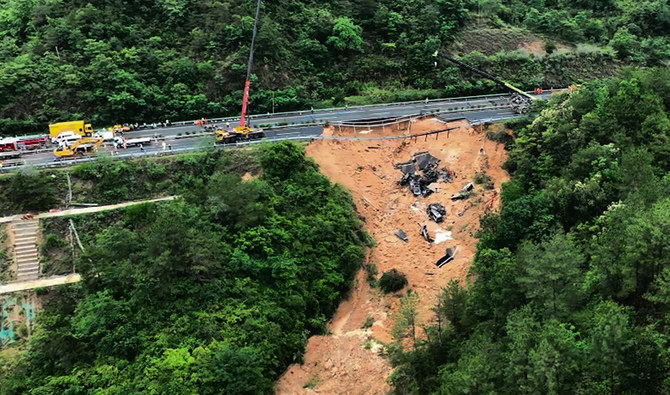
- One side of four-lane highway in Meizhou city gave way after a month of heavy rains
- Twenty-three vehicles fell down a steep slope, some sending up flames as they caught fire
BEIJING: The death toll from a collapsed highway in southeastern China climbed to 48 on Thursday as searchers dug for a second day through a treacherous and mountainous area.
One side of the four-lane highway in the city of Meizhou gave way about 2 a.m. on Wednesday after a month of heavy rains in Guangdong province. Twenty-three vehicles fell down a steep slope, some sending up flames as they caught fire. Construction cranes were used to lift out the burnt-out and mutilated vehicles.
Officials in Meizhou said three other people were unidentified, pending DNA testing. It wasn’t immediately clear if they had died, which would bring the death toll to 51. Another 30 people had non-life-threatening injuries.
The search was still ongoing, Meizhou city Mayor Wang Hui said at a late-afternoon news conference. No foreigners have been found among the victims, he said.
Search work has been hampered by rain and land and gravel sliding down the slope. The disaster left a curving earth-colored gash in the otherwise verdant forest landscape. Excavators dug out a wider area on the slope.
“Because some of the vehicles involved caught fire, the difficulty of the rescue operation has increased,” said Wen Yongdeng, the Communist Party secretary for the Meizhou emergency management bureau.
“Most of the vehicles were buried in soil during the collapse, with a large volume of soil covering them,” he said.
He added that the prolonged heavy rainfall has saturated soil in the area, “making it prone to secondary disasters during the rescue process.”
Over 56 centimeters (22 inches) of rain has fallen in the past four weeks in the county where the roadway collapsed, more than four times as much as last year. Some villages in Meizhou flooded in early April, and the city has seen more rain in recent days.
Parts of Guangdong province have seen record rains and flooding in the past two weeks, as well as hail. A tornado killed five people in Guangzhou, the provincial capital, during rain and hail storms last weekend.
The highway section collapsed on the first day of a five-day May Day holiday, when many Chinese are traveling at home and abroad.
Chinese leader Xi Jinping said that all of China’s regions should improve their monitoring and early warning measures and investigate any risks to ensure the safety of the public and social stability, state broadcaster CCTV said.
UK Veteran’s Minister Mercer to risk jail over Afghanistan inquiry
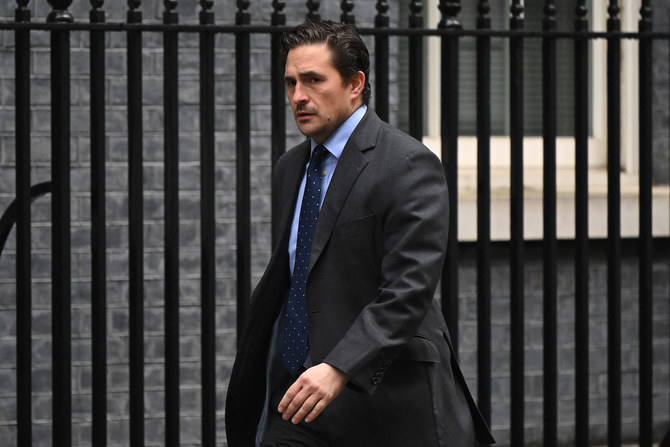
- Friends suggest minister will refuse to hand over identities of whistleblowers over fears for their well-being
- Mercer faces potential 52-week jail term, which would cost him his role as a minister and MP
LONDON: UK Veteran’s Minister Johnny Mercer will risk prison by not revealing the identities of whistleblowers to an inquiry investigating the killings of innocent people in Afghanistan.
The Times reported that friends of the MP had suggested he would rather be a “man of integrity” over the matter ahead of a deadline to hand the names to the inquiry, chaired by Lord Justice Haddon-Cave, next week.
Mercer has already given evidence to the inquiry, which is investigating allegations of extrajudicial killings and cover-ups by UK Special Forces between 2010 and 2013.
Appearing in February, he said a Special Forces soldier told him that in 2017 he was asked to carry a weapon to plant on an unarmed civilian to make them seem like an enemy combatant. He refused to reveal the source and others out of fear for their safety, with suggestions that some may be suffering from post-traumatic stress disorder and could be mentally vulnerable.
Haddon-Cave gave Mercer until April 5 to reveal the names, which was later extended. Failure to comply, he was warned, could result in a year-long prison term, which would cost him his job as a minister and his position as an MP. He could also face a fine.
One friend of the MP told The Times: “The inquiry doesn’t seem to realise that nothing will destroy their authority more than putting the veterans’ minister in the dock — the one man the military community trusts.
“If they do this, no one from the military community will want to co-operate with the inquiry. They seem to think Mercer will fold under the pressure and they will get their way. But he won’t. He will go down as a man of integrity and the inquiry will lose all support.”
Former Armed Forces Minister James Heappey said Mercer should reveal the identities of his sources.
“I admire Johnny enormously for the way that he has done politics under his own rules with an incredible sense of mission … He is a remarkable man but on this particular point I think for him, for his family and actually for the credibility of the inquiry I think he does need to disclose these names,” Heappey said.
On Friday, the inquiry will examine the Ministry of Defence’s failure to provide evidence to it on time. It is still waiting to hear from senior officials, including former Defence Secretary Ben Wallace.
It has also heard allegations that Gen. Gwen Jenkins, future national security advisor and former Special Boat Service head, locked away a report into claims of extrajudicial killings instead of passing it to military police.
Mercer also suggested during the inquiry, which began in December 2022, that the next head of the UK Army Lt. Gen. Sir Roly Walker had given “unbelievable” testimony over claims that Special Air Service personnel had killed unarmed Afghans.
An investigation by The Times, meanwhile, has suggested that former members of specialist Afghan Army units CF 333 and ATF 444 could provide crucial witness testimony to the inquiry but that their subsequent relocation from Afghanistan was overseen by MoD officials in a potential conflict of interest.
Many had their asylum claims to come to the UK rejected, a decision now under review.


